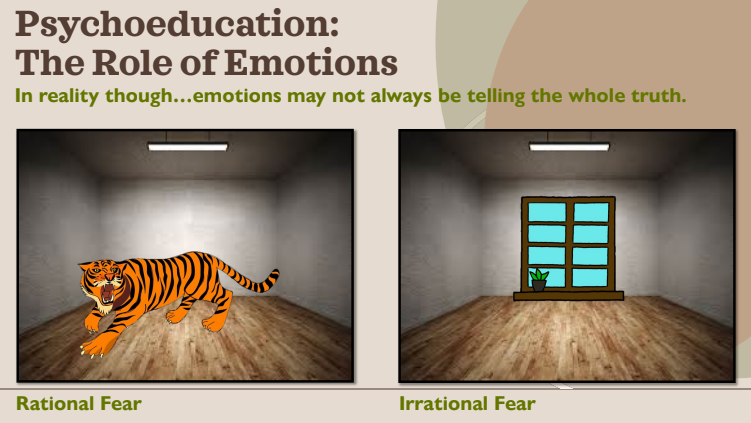Unlocking Emotional Control: Proven Strategies for Effective Emotional Regulation
by Ivey Jowers
It may seem a bit odd to think of it this way, but emotions are a lot like allergic reactions. Both are meant to protect us, despite the various ways they present. The intentions of both are good; however, sometimes in their attempt to help us, they can harm us. It isn’t the allergen that causes our faces and tongues to swell, which keeps us from taking in life giving oxygen.
It’s the body’s unregulated attempt to flood the area of perceived threat with allergen fighting cells that ultimately causes harm. Emotions can behave similarly. They are the body’s messengers designed to help us make sense of the situations we find ourselves in so that we’ll know how best to respond and stay safe.
When our external or internal environments feel unsteady, sometimes our emotions, intending to serve us, can unintentionally flood us in ways that feel dysregulating.
What is Emotional Dysregulation?
Emotional dysregulation is the inability to control or balance our emotional response to a provocative situation. Intense emotions can feel so uncomfortable and distressing that we tend to believe that what they are telling us is true and are therefore valid. In reality, though, our emotions may not always be telling us the whole truth.
For example, if we were to enter a room with a growling tiger ready to pounce, we would have a very normal rational fear response. Our hearts would start racing. Our pupils would dilate. Our breath would quicken and we would begin looking for the closest exit leading to safety. But what would happen a few months later if we found ourselves in a room that looked and felt very similar to the room that once housed the tiger?
We may once again feel our rapidly beating pulse, our quickened breath and an intense desire to flee the scene to safety. In this case, however, there is no tiger. While it makes sense we would feel that way after our previous experience, our emotional fear response now becomes irrational and is not grounded in truth.
The Essential Guide to Managing Your Feelings
So how do we regulate this irrational response to a no longer dangerous situation? The first step we can take is to observe our emotions from a nonjudgmental stance.
For example, you might want to imagine your emotions like a wave, rolling in, cresting, and then dissolving back into the ocean. You are not trying to hold on to these emotions nor are you trying to “get rid of them”, but instead you can simply acknowledge them for what they are.
You might try observing where in your body you feel emotional sensations, such as noticing when your heart is racing, if your cheeks are flushed, or you feel shortness of breath. It is important to remember that you are NOT your emotions and that there have been times when you’ve felt differently (Linehan, 2015).
What is a Crisis and How to Respond
How do we know if we are in a crisis? If the situation feels highly stressful and creates an intense uncomfortable feeling of needing to solve the situation immediately, you may be experiencing a crisis. When choosing how to respond to a crisis, you have three options:
If you can solve the problem, solve the problem
If you cannot solve the problem, determine how can you tolerate the problem without making it worse
You can choose to not attempt any crisis management skills and allow the situation to get worse.
Distressing emotions, like any other emotion, can come and go like waves in the ocean. One priority for managing a crisis is to learn how to ride the wave of emotions. Emotion regulation and distress tolerance skills are useful tools to help keep you above water and allow you to deal with the crisis more effectively.
Your Key to Resilience and Mental Health
One of my favorite and most immediately effective skills to teach clients is the TIP skill (Linehan, 2015). The TIP acronym stands for Tip the Temperature, Intense Exercise, and Paced Breathing with Paired Muscle Relaxation. When feeling distressed and dysregulated, our thoughts and nervous system can often fire signals chaotically and uncontrollably. Utilizing the TIP skill can help disrupt the dysregulating cycle and allow you a moment to get your mind and body back on line and able to access strategies for coping effectively.
Tip the Temperature: Try placing your face in a bowl of cold water or hold a cold pack on your face for 30 seconds. Holding ice cubes in your hands can also help regulate your system.
Intense Exercise: Expend your body’s stored up energy by engaging in some intense exercise such as running, walking fast, climbing stairs, doing jumping jacks or lifting weights, etc.
Paced Breathing and Paired Muscle Relaxation: Slow your breathing by practicing paced breathing, which can include belly breathing and inhaling for 6 seconds, holding for 4 and exhaling for 8. Pair your breathing with a muscle relaxation exercise. For example, while breathing out you might say the word “Relax” in your mind while letting go of any tension you may feel in the body. You can also try tensing a specific muscle on the in breath and relaxing that same muscle on the out breath and continuing this exercise as you relax every muscle in your body.
Finding Inner Balance
Automatic negative thoughts (or ANTs) can increase our likelihood of jumping to conclusions or leaning into all or nothing thought patterns, both of which increase distress. If you can identify an automatic negative thought that is causing you a great deal of distress, ask yourself the question “What could also be 100% equally true?”
For example, a client had an important deal that fell through at work, resulting in a significant loss of income for the company. The client might automatically jump to thoughts such as, “I’m going to get fired, lose my house and my family will hate me.”
When asking the client what may also be 100% true of the situation, the client may be able to also consider, “I have been working with this company for five years without any complaints or negative reviews and my boss knows I did everything I could to prevent this.”
Having the alternative thought may not completely extinguish the original distressing thought; however, it can help the individual look at the situation more realistically and understand where some skills may be needed to better regulate the mind and body.
Mastering Emotion Regulation: The Key to a Balanced and Resilient Life
Having a better understanding of the benefits and limitations of our emotions can allow us to distinguish when we are in a crisis and feeling dysregulated and when it may be helpful to implement some regulation strategies.
Utilizing skills empowers us to take control of a situation that might otherwise leave us feeling disempowered and out of control. To understand your power and potential when managing a crisis, I leave you with the words of Austrian psychologist and Holocaust survivor, Viktor Frankl, “Between stimulus and response there is a space. In that space is our power to choose our response. In our response lies our growth and our freedom.”
What is DBT? Online DBT Therapists in GA
The ideas presented in this article are part of a therapeutic approach called Dialectical Behavior Therapy (DBT). DBT is an evidence-based therapeutic approach that focuses on providing individuals with effective coping skills to manage intense emotions, improve relationships, and build a life worth living. DBT combines elements of cognitive-behavioral therapy (CBT) with mindfulness practices, emphasizing acceptance and validation alongside skill-building strategies.
If you find yourself struggling with overwhelming emotions, difficulties in relationships, self-destructive behaviors, or a sense of emptiness, DBT may be the right therapeutic approach for you. Our skilled therapists at Perspectives Center for Holistic Therapy are experienced in delivering DBT with compassion and expertise, helping you develop practical tools to navigate life's challenges and find balance.
Contact us today for a free consultation to learn how therapy can help, either with in-person sessions in Tucker or Roswell, or online therapy in Georgia, South Carolina, North Carolina, or Florida.
About the Author
Ivey Jowers provides psychotherapy for adults, teens, and couples in Tucker, GA and online in Georgia. Her specializations include chronic pain, anxiety, grief, and religious trauma.












